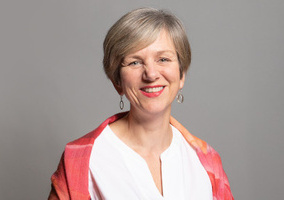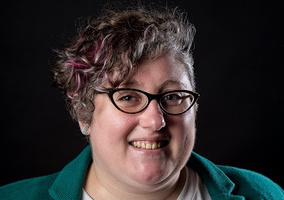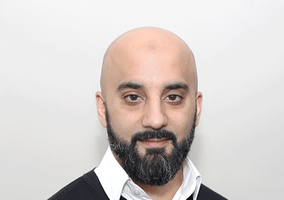Gemma Peters has been involved in charitable activity for as long as she can remember. At school, she organised an Amnesty International activist group, and at university, she fundraised for various charities.
After studying politics, she got a job lobbying, influencing and campaigning in the Open University’s political liaison team and later joined its newly established fundraising group.
Peters says that she used to see charities as “things you did in your spare time” but working as part of that fundraising team changed her perspective.
“Getting into the profession of fundraising and understanding what that was, I then thought: ‘Well, if I like this, where’s the place to learn it?’ And clearly, the charity sector was the place to learn it.”
She moved to London and got a job at deafblindness charity Sense as an events manager before joining learning disability charity Mencap as head of events.
After spending a few years in the charity sector, she returned to the higher education and health sectors where she held various senior positions.
She returned to the charity sector, which she had “missed a lot”, 13 years later as chief executive of Blood Cancer UK in 2017 and became Macmillan’s CEO in January this year.
“I missed the absolute passion and determination of people in the sector and the focus on filling whatever the gaps are, the need that has arisen. That hasn’t changed and that’s really important. That’s one of the reasons I love being in the sector.”
Charities used to have ‘a loud voice at the table’
Peters feels there has been a definite shift in terms of how much voice charities used to have when she left the sector and how they campaign these days.
“I left Mencap at a time when it felt like there was a loud voice at the table and the influence of civil society was strong. I came back into a sector feeling much more cautious about what it could and couldn’t say, feeling shut out of decision-making rather than brought in and fighting for a voice.”
She says attitudes towards charities engaging in political campaigning have become “much more hostile in general”.
“Anyone who’s speaking out on behalf of people by nature feels real trepidation about that because of what might happen as a result of speaking out. There’s a noticeable trepidation in some parts of the sector.”
Spending down reserves
In 2022, Macmillan made “a strategic decision” to spend more than a third of its reserves, ending the year with £48.3m compared with £74.1m a year earlier.
Macmillan operates a liquidity rather than a reserves policy, as it has several multi-year grant commitments. After reviewing its policy, the charity reduced its liquidity target from £100m to £70m, which is the amount it needs to maintain a “healthy financial position”.
Peters says that Macmillan is in the process of finalising its budget for 2024, and expects to take out another £25m from its reserves.
“Before I got here, the trustees took a decision that we shouldn’t have excess money in reserves at a time when there’s such great need out there, which I think is the right decision,” she says.
“So, what we’re doing is pushing more money out, particularly in the financial assistance space, to get to people who need the help now. Ultimately, next year will be the last year we’re doing that. So, [in 2025] we need to be back completely in line with what we’re raising and what we’re spending.”
Involving people with lived experience
Macmillan is working on a multi-year strategy to move away “from doing things for people living with cancer and instead towards working in equal partnership with them”.
As part of the process, the charity invited people with lived experience of cancer to have their say about its future by completing a survey. It is going to be hosting a series of conversations with communities as a way to involve people, among other things.
Peters says the process behind the strategy, which she expects to be published next year, is “about being really clear about what we want the UK to be like for people with cancer, what part Macmillan plays in the ecosystem to get us there and how we’re aligning our resources to make sure we do that in the best possible way”.
“I wanted to use the strategy process as a way of driving some of the cultural change I want to see in the organisation. So, much more co-design and development with people with cancer, particularly people with cancer who are minoritised in some way and have the worst health experiences. We’ve designed the process to be inclusive of voices that we don’t usually hear.”
She says that because Macmillan has “evolved organically over quite a long period of time, it can be quite clunky, siloed and a bit too hierarchical”.
“We’re using lots of agile methodology in how we do the strategy, so teams of people from all different parts of the organisation coming and working together for fixed periods of time on particular questions.”
Setting EDI targets
In 2021, Peters’ predecessor, Lynda Thomas, admitted that Macmillan had “a problem with the diversity of its workforce, especially at a leadership level” and announced an equity, diversity and inclusion (EDI) strategy.
A year later, a workplace review carried out by the Social Justice Collective revealed overt and covert racism and ableism at the charity, with senior leaders and the human resource team “lacking expertise” when handling those types of complaints.
For Peters, it is “absolutely right that the organisation needs to be much more representative of the people it’s trying to help”.
“Cancer is fully representative of the whole population, so the organisation needs to be. It’s not just about representation, how diverse are we as an organisation, but also, what space is there within the organisation for people from all sorts of backgrounds to thrive? Is it a safe environment where people can be themselves? Is it an environment where people can do their best work? Is there representation at all levels?”
Macmillan has set itself targets around EDI, including having 16% of staff who have declared themselves as disabled or neurodivergent or have or previously had a cancer diagnosis and 20% who are from ethnically diverse backgrounds by 2025.
As of 1 October 2023, 18.5% of the charity’s employees were disabled and 13.1% ethnically diverse, based on data from an optional internal census, compared to 12.2% and 9.4% a year earlier, respectively.
“My biggest concern coming into the organisation, because of some of the publicity, was: ‘Is this an organisation where people are free to speak up? If there’s something going on, that means that some bits of the organisation have a culture where people are intimidated.’
“So, we’ve introduced a lot of things around support for managers and leaders of the organisation to really understand oppression and how it shows up at work. We’ve put in things like a speaking up platform, ways for people to raise anything that they see or experience themselves. That data is anonymised but plays back to the organisation so that people can learn and improve.”
Peters is pleased that the organisation is making progress but says there is an “awful lot more to do”.
Drive for greater impact
Peters is optimistic about Macmillan’s ability to make a greater impact on people with cancer under her leadership.
The challenge, she says, is ensuring that her charity successfully diversifies its income sources as it is currently heavily reliant on fundraising activity, which represents 98% of its total revenue.
“There are other opportunities for the organisation to think about how it’s able to drive impact for people with cancer that aren’t reliant on that. There are some really interesting, different models already in the organisation that could be scaled, where we’re able to drive improvements through investments with other partners that then pay back so it doesn’t necessarily require every year to keep raising the same amount of money. Part of what we need to do in the strategy is explore that.”
Reflecting on the charity’s financial stability, she says: “Macmillan is big and can weather a whole load of stuff before it’d be in trouble. I’m much more worried about organisations I hear from regularly where they’re providing invaluable services for people with cancer and don’t have the 100 years of building up the resources and equity Macmillan has.”
Collaboration is key
Although Macmillan is a big charity, Peters says it is “one tiny little cog in the health system that will drive the change for people with cancer”.
“We’ve got a role to play in making sure there’s an ecosystem that works. If everything else in the ecosystem isn’t working, then Macmillan’s model doesn’t work either because we refer to so many different organisations and different organisations refer to us that we’re already interrelated.
“We have to understand how to partner, collaborate and drive change with others if we’re going to have anything close to our potential impact. For Macmillan, that means sometimes leading on stuff because we’ve got the resources to do it, sometimes getting out of the way, and sometimes being the jetpack for another organisation that’s much better placed to have the conversation or deliver impact.
“The skill of partnering is something that over the last 20 years of my career I’ve learned isn’t just something that happens because you say you want it to happen. It happens because you invest in the organisation to really understand how to be a partner.”
Related articles












